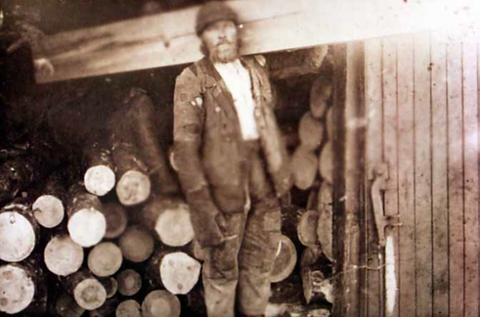

Daniela in Siberia, with a pram they brought from Poland
Daniela Kozik
Following the Russian invasion of Poland in 1939, the Soviets began transporting men, women and children to an annexed region known as Siberia. The transports started on 10 February 1940.
Siberia is not just a geographical region; it is a symbol expressing the martyrdom of hundreds of thousands of Poles fighting with a murderous system which never had any respect for human freedom or dignity. The word ‘Siberia’ became synonymous with oppression, slave labour, martyrdom, captivity, and struggle for independence.
Forced onto cattle trucks, they were taken to camps where they worked like slaves, felling trees, building roads and railways and working in coal mines.
The snow had started to fall, that bitterly cold February morning when the horse-drawn carts arrived. One of them pulled up outside Daniela Kozik’s home, and a Russian soldier told her family: “You are being deported to Russia. Take what you want, load it on to the cart. You must all come.”
Sitting at the kitchen table, he asked for documents – birth and marriage certificates and deeds for their land and property – and confiscated them.
As the family gathered belongings they had already started to pack when dark rumours circled their village, Oryszkowce. Daniela’s grandmother, sat with tears in her eyes and a prayer on her lips. She gave Daniela a faint smile and put her arms around her and Alexander, whispering: ‘You poor, poor children’..
Joining a convoy of carts to the railway station, their silence was broken by the occasional cry of a child and the distant sound of abandoned farm animals. Soon the family was boarding a cattle truck without windows and only wooden floors to sit on.
People were loading cases, boxes, baskets, pots and pans onto the train. It was not easy walking through deep snow, carrying luggage. People were sliding and falling, sometimes spilling contents of their packages.
What followed was a journey in darkness, in sub-zero temperatures. They could not tell if it was night or day, and the packed wagon became more unbearable each day. Sometimes the children played guessing games, told riddles or sang songs. They tried to read and draw, straining their eyes in the dim paraffin light.
Unanswered questions were repeated: Where are we going? What are the Russians going to do with us?’ On and on they travelled, it seemed a journey without end.
As the cattle truck travelled through mountains, Daniela awoke to find the adults huddled around her sobbing. Her mother passed a bundle to a soldier. It looked like the white cushion she used for wrapping Daniela’s brother. Daniela shook from fear, as she became aware that Alexander had been given away. Like many babies, Daniela’s brother had died during the long journey.
When the train finally reached its destination, everyone was ordered off. They were in a pine forest with towering snow-covered trees. The daylight hurt their eyes. Along a road between the trees were sledge-like objects; a few planks of wood tied with ropes. People loaded their belongings on them then placed the elderly and small children on top.
Perched on a sledge with her mother, Daniela caught her first glimpse of a place that was now home. Suddenly there were rows of log cabins in a clearing in the forest. Their family was allocated a cabin, where her parents, grandparents, two aunts, three uncles, six cousins and Damiela were to live.
After the Second World War she settled in Bradford, UK, like many Poles who survived Stalin’s brutal transportation regime which began on 10 February 1940. Over a two-year period, over 1.7 million men, women and children were taken from Russian-occupied Poland to Siberian labour camps.
More than 70 years later, Daniela's memories are being recorded, so the world can remember, and learn from these harrowing but remarkable experiences.
Copyright: Kozik family

Left to right: Daniela's Aunt
Maria, Aunt Jozefa, Daniela and
her mother

Daniela's father at work in Siberia